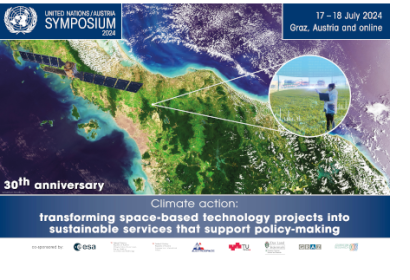
More information on the event's website.
Important dates
- Preliminary programme has been released
- Deadline for registration to attend online: 10 July 2024
Theme
Space applications and technologies have significant potential to contribute to mitigating and adapting to the effects of climate change. Every year there are demonstrations of new innovative technologies and launches of pilot projects that promise to address issues of forest fires, land degradation, floods, droughts, loss of biodiversity, agriculture, disaster management and more. Yet, many of these projects struggle to take off or fail to achieve long-term success. Beyond technical feasibility in the transition from a technical project to a sustainable service is a lack of understanding of how to make it happen.
Technical innovation without effective implementation does not lead to meaningful change. Taking the right steps to transform a technical project into a sustainable service with tangible measurable impact on people's lives is essential to ensure that those who need solutions are empowered and those who can help do so in a financially viable and responsible way. Successful cases integrate and manage social, financial, political and regulatory dynamics to accelerate the transformation.
The UN/Austria Symposium 2024 aims to bridge the gap between space applications and technologies providers, users and wider community. It aims to provide a diverse and inclusive multi-stakeholder platform to raise awareness of the challenges in transiting from a technical project into a sustainable service and facilitate knowledge exchange and sharing of lessons on how to successfully do so. The symposium in Graz will offer a possibility to share lessons learnt and success factors in transforming projects into sustainable services for climate action.
The presentations and discussions will address the role of governmental support, financing, capacity building, users empowerment, impact measurement metrics, amongst others. Successful case studies from various countries and organisations will also be discussed. The symposium aims to stimulate cross-fertilization of ideas and experience among policy makers, service providers, the private sector, academia and user communities and foster collaborations among different groups.
Objectives
The symposium has the following objectives:
- To demonstrate how initiatives based on space applications have been successfully developed and implemented in different countries.
- To promote the exchange of best practices in transforming technical projects into sustainable services that have measurable impact and meet the demand and needs of developing countries in mitigating and adapting to climate change.
- To share experiences and explore how space-based services can be used to comply with or support policies about climate action according to national priorities.
- To present available toolboxes that have already been implemented through case studies or pilot projects at a country level to comply with regulations related to climate action, with the aim of encouraging the adoption of tested tools and approaches.
- To raise awareness of the Space for Climate Observatory (SCO), relevant space-related activities, services and cooperation programmes among different user groups, in particular government officials, the diplomatic community, UN and international agencies as well as non-governmental organisations.
- Create opportunities for cooperation and collaboration with funding organisations and international organisations.
- To report to the UN Committee on the Peaceful Uses of Outer Space through the Scientific and Technical Sub-committee.
Programme
The programme includes:
- Keynote presentations: given by invited speakers.
- Panel discussions: roundtables during which speakers give a short presentation, followed by a moderated discussion among speakers and Q&A with the audience.
- Country case: a panel discussion focusing on a particular country.
- Video pitches: short presentations introducing specific projects or initiatives in less than 5 minutes.
- Social events: evening receptions, as well as a guided tour of the city of Graz (TBC).
- Networking opportunities.
